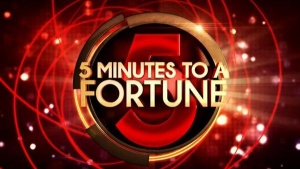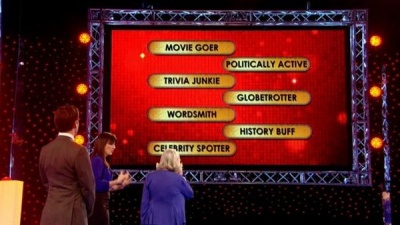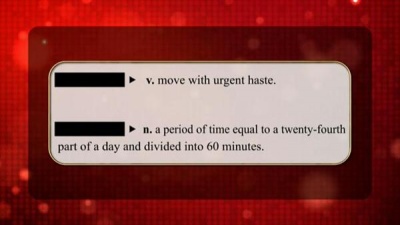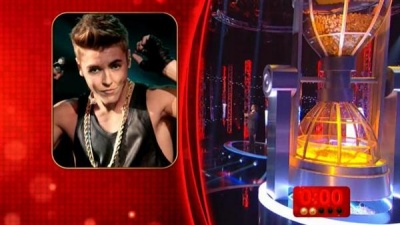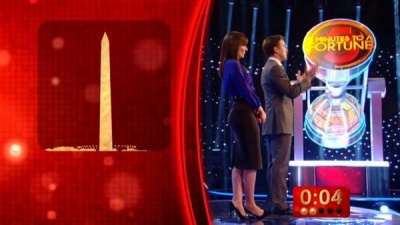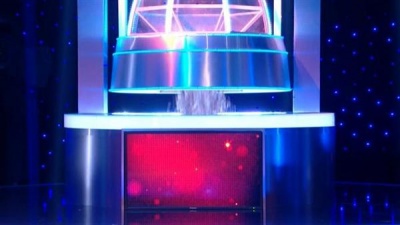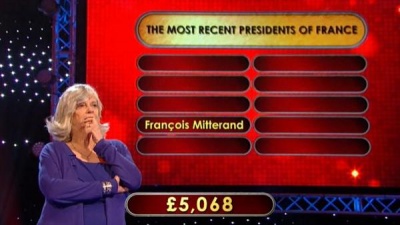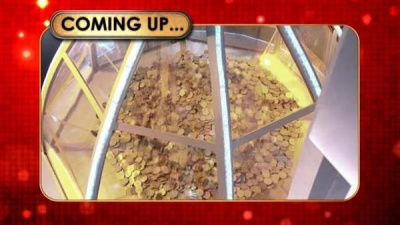Five Minutes to a Fortune
Contents[hide] |
Host
Co-hosts
Gideon Turner (voiceover)
Broadcast
Victory Television for Channel 4, 6 April to 5 May 2013 (20 episodes in 1 series + 5 celebrity specials)
Synopsis
By the early part of the 2010s, 5 o'clock had become an ultra-competitive game show hour. ITV had The Chase, a rapid-fire quiz that had turned into a proper Ratings Beast (in Mark's absence, a Ratings Governess, Ratings Dark Destroyer, or Ratings Sinnerman). BBC1 sashayed along a quarter-hour later with Pointless, a battle of obscurity that made unlikely stars out of Xander and Richard.
Channel 4? They had lifestyle competitions Come Dine with Me and Three in a Bed, they'd tried travel shows like Coach Trip, and straightforward cooking programmes with the likes of Gordon Ramsay. Into this mix was pitched a straightforward game show. The star of the show is, quite obviously, a giant hourglass.
This perspex beauty doesn't just hold your money - £50,000 in the regular game - but it actually rotates and flips over. Coins fall from the top down to the bottom, marking the passage of time as it passes. Decorated with a "5 Minutes to a Fortune" logo on its base, this ten-foot giant will impress and tower over everyone who visits your studio. Even Richard Osman.
Assisting the giant hourglass are two people. The voice of Gideon Turner reads out the questions and explains what's going on. Davina McCall, the well-known Channel 4 presenter, is in front of the camera. She'll meet the contestants, guide them through their experience and celebrate their large win - or console them at losing everything. It's Davina, she does that emotional sort of thing really well.
Five Minutes to a Fortune is played with pairs of contestants: the Timekeeper and the Gameplayer. The two roles are clearly different, a separation between making grand plans and actually carrying them out.
Seven categories are presented on a board. These carry names ("Well Read", "Film Buff", "Wordsmith"), describing the subject matter. Without consulting their partner, the Timekeeper picks a category, and Gideon explains the form of each challenge.
In every category, the target is to complete five of these challenges correctly.
Have you got a minute?
Now, the Timekeeper is allowed five minutes of free time. They're allowed to give as much or as little time for each category as they like: generally, Timekeepers allocate between 45 seconds and 1 minute 15. Again, the Timekeeper can't talk to their partner. Once they've given the time from that budget, the Timekeeper retreats to stand behind a big white podium, topped by a big red button. We'll come back to that later.
Only now does Davina get to ask the Gamesplayer what they feel about the choice and the time. And then they're into the category, trying to rack up the five correct solutions. Gamesplayers can pass on a question, and the correct answer will be given at the end of the round. Gamesplayers can give a wrong answer; they'll hear a beep and can answer again - the question changes only when they give a right answer or pass.
The Timekeeper is a master of time, and cannot help with the answers. They must take a back seat (well, stand at the back, as there are no seats), and silently scream as their partner passes yet another question.
It's time for you to pay
On occasion, the Gamesplayer completes the category with time to spare. This is positive, because their prize is maintained, though the excess time is lost from the game. The ideal is to complete with just a second or so left.
With ten seconds of free time left, the giant perspex hourglass begins to turn over. And when the clock reaches zero, the money begins to drain. Pistons and levers make the metal coins go chunk-chunk-chunk down from the top into the base. It sounds brilliant, and looks awesome on screen.
Even while the money is draining, even while Davina is shouting "the money is draining", the Gamesplayer continues until they reach the required five correct. Afterwards, passes are solved, and the coins drop out of the glass to be weighed and measured and displayed below.
Except... remember how the Timekeeper has that big red button? That's the Emergency Stop button, and the Timekeeper can press it at any moment to end the current category. The Gamesplayer has two seconds to get four answers and is panicking? Stop now.
After stopping the old category, a new one is chosen at random. The new category is a do-over of the old one - the same amount of time gets used, but any money lost remains lost.
Take your time away
Eventually, hopefully, the Gamesplayer will complete the five categories. Their work is done, all they can do is cheer on from the sidelines. The Timekeeper steps forward, and picks a category from the board - only when they've not used the Emergency Stop do they get a choice of category.
From this category, the Timekeeper must name five of the top ten answers to a question. Examples have included the most populous ten cities in the world, the most recent James Bond movies, and the last ten presidents of France.
The Gamesplayer doesn't keep time. They will only play games. So the Timekeeper has ten seconds to start on their list, while the hourglass turns. And then the hourglass starts to drain. Draining straight into the abyss, money is literally falling out while the player shouts answers. Whatever remains after five correct answers goes home with the players.
How did they cope?
Most contestants left empty-handed: completing the five categories in the time allowed was generally possible, but the final game proved very difficult. Winners tended to win big, a team took a prize of over £20,000 most weeks. Davina played to her strengths of empathy and bravado, saying "you've lost a bit of money" to show that the team hadn't kept everything, but they hadn't lost all money, and nor should they lose all hope.
Unless teams lost all their money early, a game of Five Minutes to a Fortune would last slightly less than one full show. Teams would straddle from one programme to the next, though never over the weekend. Viewers who tuned in at 5.50 would be encouraged to pick up the same team at 5.05 the next day.
People who saw Five Minutes to a Fortune tended to like it. Game show fans were vocal in their approval, suggesting little format tweaks, ways to make a great show even better. The variety of games was praised, though there was a suggestion that some - especially "put these numbers in alphabetical order" - appeared a little too often. The rest of the viewing public tended to stick with the shows they knew, though The Chase was sufficiently worried to cancel a week of repeats.
Catchphrases
"The hourglass is turning."
"Stop the drain!"
"Pass" ... "Pass" ... "Pass".
Inventor
Devised by Stuart Shawcross
Theme music
Nick Foster and Ken Bolam composed a full score.
Trivia
The "hourglass" is actually a four-minute timer, draining money at £12,500 per minute (or £208.33 a second). Solving the various categories in a total of 7 minutes leaves a prize of £25,000, but the title Seven Minutes to Substantial Moolah doesn't quite have the same ring.
While members of the public played during the week, celebrity editions were screened on the weekend. The participants were:
- Ann Widdecombe and Anton Du Beke
- Jo Brand and Meera Syal (won £35,480)
- Gok and Kwoklyn Wan
- Rachel Riley and Russell Kane (won £18,020)
- Jay and Keith Duffy
- Heston Blumenthal and Will Greenwood
- Jon Snow and Krishnan Guru-Murthy (won £47,555)
The massive hourglass prop, and the rest of the studio set, was devised by the aptly-named Huge Designs company.
Answers to the questions in the main text: the film is Rush Hour, the face is Justin Bieber, the monument is Cleopatra's Needle, and the list of presidents runs from François Hollande back to post-war caretaker Albert Lebrun.
Voted the Best New Show in this site's Poll of 2013
Carlyn Coyle and Scott Carwood were awarded £26,000 (of a possible £46,000 jackpot) after Channel 4 admitted that the producers had used out-of-date information for a question regarding the cities with the busiest airports.
Web links
From Bother's Bar, a taping report and show discussion; in the latter, commentator "Stuart" is Mr. Shawcross, the show's devisor and co-producer.
The Fifty50 Show, a game show podcast, reviewed the opening episode, and noted how the coins remaining in the hourglass were raked flat by someone.
The show used social media: #5minstoafortune @5minstoafortune
See also
Game show scholars noted parallels with many previous shows. Short challenges were most recently seen on Minute to Win It (ITV2, 2011); many of the actual games reminded us of mental agility from The Krypton Factor (ITV, 1977-2010). A pair of players with very different responsibilities was pioneered on Jacques Antoine's La Tête et les Jambes (Antenne 2, 1975-78). Players of chess and other mind games will recognise the delay time control. The final game with a rapidly decreasing jackpot evinces 19 Keys (Channel 5, 2003) and Panic Attack (BBC Northern Ireland, 2008-9); calling out answers while Davina tries to fill dead air was common on The Vault (ITV, 2002-4).

